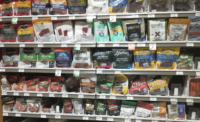U.N. effort targeting meat's role in climate change
Food systems account for about one-third of global greenhouse gas emissions, with much of that related to livestock production.

The world’s most-developed nations will be advised to significantly cut their consumption of meat as part of a United Nations plan to bring global agriculture and food production in line with the Paris climate agreement goals.
Climate-change mitigation goals are expected to be published by the United Nations’ Food & Agriculture Organization during the COP28 climate change conference in the United Arab Emirates. Nations with greater levels of meat consumption will be advised to reduce their intake, while developing countries will advised to improve their livestock practices.
From farm to fork, food systems account for about one-third of global greenhouse gas emissions, with much of that linked to methane emissions and deforestation related to livestock production.
The average American consumes nearly 280 pounds of meat each year. Climate regulators recommend consuming about 35 pounds of meat annually.
Factory farming in focus
A major focus of the COP28 event is calling for restricting factory farming as a key approach to cut greenhouse gas emissions.
Factory farming contributes at least 11% of global emissions, according to research from World Animal Protection. The organization said around 70% of the 80 billion animals raised every year for food were held in factory farm systems, contributing 6.2 billion metric tons of CO2 emissions annually.
The COP28 agenda calls for a 10-year moratorium on new factory farms while urging countries to redirect subsidies to more sustainable livestock and plant-based food production.
Meat beats cancer?
Eating red meat might help prevent cancer, a new study suggests.
Researchers found that trans-vaccenic acid — a fatty acid in beef, lamb and dairy — enhances the ability of immune cells to combat tumors.
This study also indicates that higher TVA levels in the blood correlate with better responses to immunotherapy. The study showed that a TVA-enriched diet in mice significantly reduced tumor growth in melanoma and colon cancer, and improved tumor infiltration by the body. Additionally, TVA improved the efficacy of an immunotherapy drug in killing leukemia cells in patients.
Looking for a reprint of this article?
From high-res PDFs to custom plaques, order your copy today!
.png?height=96&t=1647275041&width=96)





